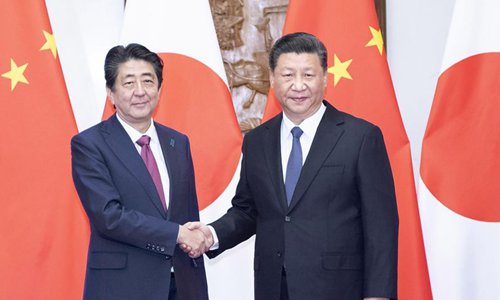Japan needs to end its two-faced China policy

Chinese President Xi Jinping met with Japanese Prime Minister Shinzo Abe in Beijing in October 2018. File Photo: Xinhua
Action speaks louder than words. This is the adage we have to keep in mind when thinking about China-Japan relations.
With the Osaka G20 summit coming up, official sources have confirmed that Chinese President Xi Jinping will attend the meeting, which is widely seen by the Japanese side as proof of improved relations with China. News also indicates the possibility of an official visit to Japan by President Xi next year.
Since Japanese Prime Minister Shinzo Abe visited China in October 2018, a thaw in ties has been the subject of discussion. In March, Abe even declared at the congress that Japan-China relations had been restored to normalcy. As a token of that, two economic delegations led by Japanese Foreign Minister Taro Kono and Secretary General of Japan's ruling Liberal Democratic Party Toshihiro Nikai were sent to Beijing the next month.
The Chinese government responded to the Japanese gesture in a positive but more restrained way. Shortly after Abe's declaration that relations were back on track, Chinese State Councilor and Foreign Minister Wang Yi said at a press conference that the two countries were just in the incipient stages of improving relations. More is yet to come, and more needs to be seen.
Until now, there has been more rhetoric than action by Japan. Both Japanese delegations sent to China functioned more in a symbolic manner, without reaching substantial deals or drawing action plans. The one led by Nikai attended the Second Belt and Road Forum for International Cooperation organized by the Chinese government, but only expressed Japan's support for the plan, instead of making its intentions about joining the plan clear.
In fact, Abe himself was questioning the China-proposed Belt and Road Initiative during his trip to Europe in April. Furthermore, some of Japan's recent moves can be seen as hostile toward its neighbor. On April 19, Japan and the US organized in Washington DC the traditional security consultative committee between the two countries in which US Secretary of State Mike Pompeo blamed China for launching cyberattacks. The joint statement further specifies that a cyberattack could constitute an armed attack, and thus trigger Article V of the Japan-US Security Treaty. This means China is seen as a potential enemy in cyber space, and Japan and the US will act together, once either of them purportedly comes under cyberattack by China.
According to the Yomiuri Shimbun about three months ago, the Defense Ministry of Japan decided to develop a long-range missile, which is expected to be based on an existing model XASM 3, and will be compatible with the most advanced F-35 fighter jets imported from the US. What is more surprising is that Japan's Defense Ministry justified its decision by citing the so-called increased attack ability of the Chinese navy. As Abe claim to normalize ties with China, Japan has shown another face on multiple occasions.
Abe has been promoting himself in Japan as a leader enthusiastic about diplomacy and having forged rich outcomes in handling foreign relations. The coming G20 summit is another seemingly perfect stage for him to show the Japanese people his diplomatic skills, especially when the upper house election is impending. However, Abe's interest in diplomacy has in fact led him to a dead end in almost every direction.
After Abe met with Russian President Vladimir Putin many times, the hope of striking a peace treaty with Russia and retrieving at least part of the so-called northern territories is now almost dead. At the beginning of this year, Japanese congressman Katsuyuki Kawai, who is also Abe's special advisor for foreign affairs, said publicly in the US that Japan's purpose in signing a peace treaty with Russia is to form a united front against China, only to trigger strong objection from the Russian side.
Japan has been feuding with South Korea on various issues for a long time. Abe's recent whim to negotiate with North Korea without condition was rejected by the latter and dubbed "shameless". Even relations with the US are getting strained: Trade negotiations between Japan and the US are set to start right after the upper house election in July. With Trump wielding his "America First" stick, Japan will be forced to make more sacrifices.
So China is now the last hope for Abe to gain Brownie points in diplomacy, and this explains to a great extent the recent thaw in China-Japan ties. But Japan should understand that the two-faced policy it has been demonstrating will hardly bring about real trust. As the traditional international order is reshaped, it would be wise that Abe steer his country into a true partnership with its neighbor.
The author is a lecturer at the School of History, Wuhan University. opinion@globaltimes.com.cn